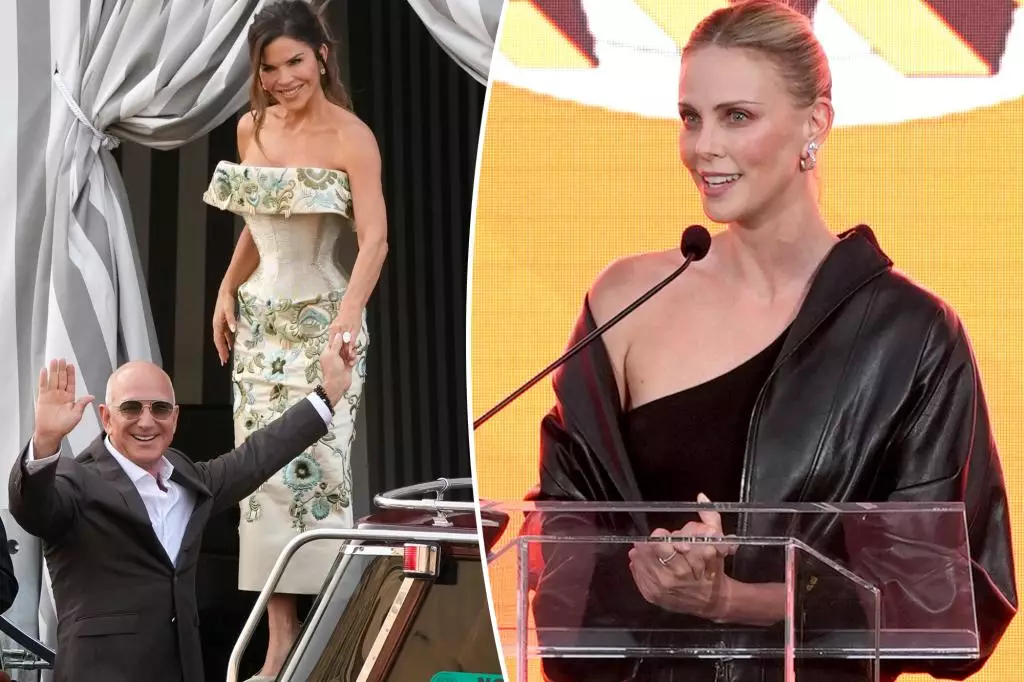When Jeff Bezos and Lauren Sánchez chose Venice as the backdrop for their lavish $50 million wedding, the event attracted a whirlwind of attention—not just for its star-studded guest list and luxurious festivities but also for the sharp contrasts it highlighted in today’s society. The extravagant spectacle, complete with performances by notable artists and attended by an array of A-listers, sparked reflection and critique from unlikely quarters. Among the voices that stood out was Charlize Theron, whose pointed remarks underscored a growing disconnect between wealth displays and the pressing issues confronting the world.
Theron’s reaction was more than just witty dismissal of not being invited. At her own event—the Charlize Theron Africa Outreach Project’s fifth annual Block Party—she leveraged the platform to voice frustration over global regressions in social justice and human rights. Within a context framed by the world “burning” from crises, her retort to the Bezos wedding was as much a critique of ostentation as it was a call to prioritize empathy and activism. By framing policies harming immigrants, women, queer, and trans communities as not merely political but deeply personal, she challenged her audience and the public at large to confront uncomfortable realities often overshadowed by glitzy headlines.
Venice Under Siege: Local Backlash to Billionaire Festivities
Beyond personal statements from celebrities, the wedding stirred significant local dissent. Protests erupted in Venice, highlighting unease about the commodification of a city already grappling with mounting challenges. Greenpeace’s provocative banner in St. Mark’s Square was a symbolic gesture aimed directly at Bezos, accusing him of tax dodging and poor labor practices—issues reflecting broader concerns about corporate responsibility and socioeconomic fairness.
This tension points to an underlying conflict between global wealth and local sustainability. Activists emphasized fears that expensive events like Bezos’ wedding exacerbate housing costs and accelerate depopulation, threatening the fabric of Venice’s historic community. It raises critical questions about the ethics of privatizing public spaces for exclusive celebrations when residents face everyday struggles. Moreover, it exposes a gap in governance, with local leadership accused of favoring commercial gains over addressing systemic problems.
Philanthropy Shadows the Extravagance
Complicating the narrative, reports indicate that Bezos and Sánchez made discreet charitable donations to Venice months prior to the wedding. This gesture, while commendable, remains overshadowed by the overwhelming spectacle of opulence and the broader socioeconomic critiques it inspired. It illustrates a tension often found in the realm of extreme wealth: philanthropic acts, however generous, sometimes appear as mere counterbalances to the excesses that draw public ire.
One must consider whether such donations genuinely address the deep-rooted issues ignited by these events or if they serve more as image management tools. The scale and context of giving matter profoundly—especially when set against the backdrop of luxury that can alienate or even demean less privileged communities.
Reframing the Celebrity Narrative
Charlize Theron’s blunt dismissal of Bezos and Sánchez’s wedding—“they suck and we’re cool”—while seemingly irreverent, exemplifies a needed shift in how celebrity culture engages with wealth and power. Her stance suggests that true influence comes not from ostentatious displays but from aligning public platforms with advocacy, altruism, and a commitment to justice.
In an era when inequality is stark and visible, the spectacle of expensive celebrations triggers inevitable questions: Whose stories are elevated? Whose struggles are ignored? Theron’s remarks remind us that while glamour and wealth dominate media cycles, authentic leadership demands confronting uncomfortable truths. It’s not about the size of the party but the substance behind the voice—something the actress clearly champions.
The Cultural Cost of Luxury
Ultimately, Bezos’ wedding—and the reactions it provoked—serve as a microcosm of wider societal discord. The allure of extravagance comes at a price, often paid by marginalized individuals and communities. Theron’s outspoken commentary, paired with grassroots protests, underscores a growing impatience with unequal displays of wealth that fail to engage responsibly with their context.
This tension invites deeper reflection on the roles of celebrities and billionaires in shaping public consciousness. It challenges us to envision a world where celebrations of success coexist with genuine solidarity, and where privilege isn’t flaunted but leveraged to foster equity and shared prosperity.

